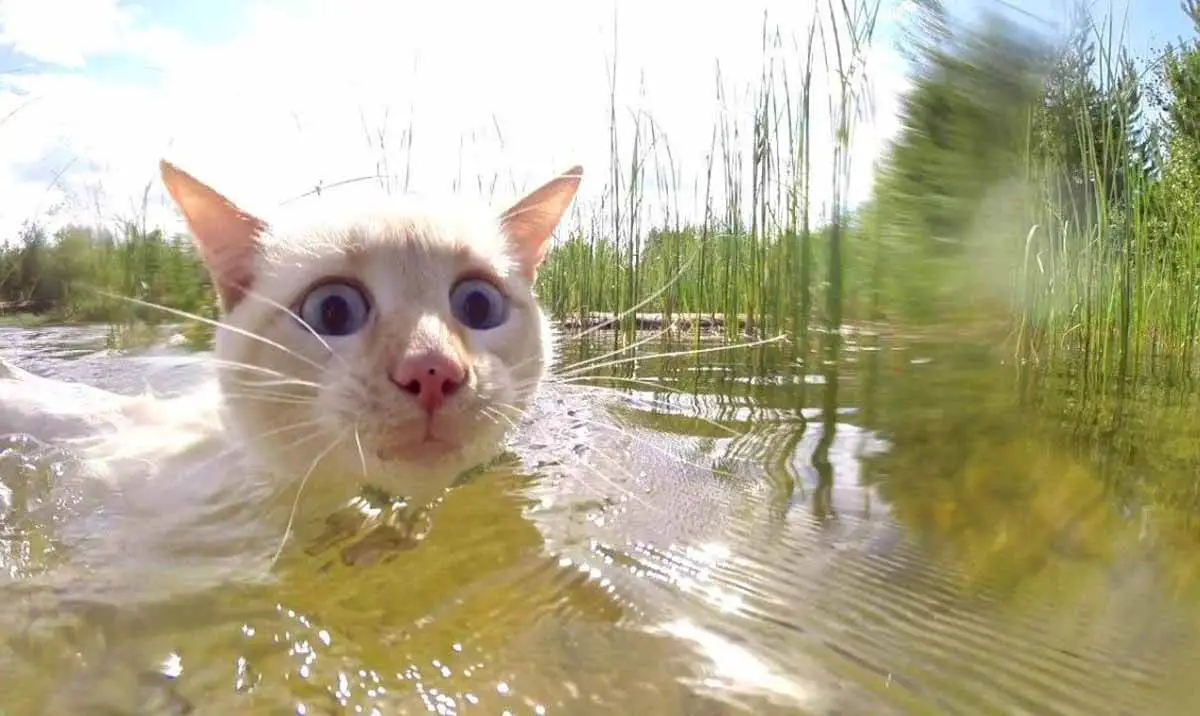Have you ever tried bathing a cat? If so, then you probably know that hardly any house tiger loves water. The question, however, is whether or not cats can swim despite their apparent aversion to water. This post answers the question.
Do Cats Know How to Swim?
- Cats can basically swim.
- There are even cats who love water.
- Small cats like water more than adult cats.
- Adult cats do not want to swim; experience has shown that they prefer dry fur.
Naturally Good Swimmers: Cats Stay Afloat

It’s hard to believe, but cats are naturally good swimmers. If they fall into the water, they automatically jump out again almost like a rubber ball, but they could well move around in the water for a while. Anyone who thinks cats cannot swim is seriously mistaken. There are tiny skins between the toes, they look like tiny webbed feet, but they are not. They serve to enlarge the stepping area on soft ground and ensure a safe walk. The Southeast Asian fish cat, however, has real, pronounced webbed feet. These increase the water resistance and make it easier for her to move around the water fairly quickly.
How Long Can Cats Swim?
If need be, cats can move about in the water for minutes. If they get into an emergency, the enduring four-legged friends can endure it much longer. As the temperature drops, swimming time is shortened, just like with humans. Age, weight, and health also affect how long a cat can swim. However, practice shows that as soon as most cats come into contact with water, they want to get out again as quickly as possible – and the faster the fitter they are.
How Long Can Cat Fleas Swim?
Cat fleas are very tough. In case you want to drown them, you can expect them to survive for about 24 hours. However, the small fleas stay on the surface of the water. They are so light that they can literally walk across the water – the water tension is too high. If you want to drown cat fleas, you have to add dish soap to the water. This dissolves the water tension and the fleas drown. Nevertheless, wait 24 hours before throwing away the flushing water to make sure that the fleas are really dead.
Can Cats Dive?
There is a short answer to this short question:
Yes. If cats have to, they can dive. However, they prefer to stay dry.
Why Don’t Cats Like to Swim and Bathe?
There are always funny cat videos in which young kittens splash around in the bathtub. This is not the rule, but what young fur noses have in common is that they like to play with water. Be it using the dripping faucet as a toy or crouching by the pond and fishing for fish. Later they avoid the water, because they have learned a lot through more or less bad experiences and experiences. Most cats are afraid of water for these reasons:
- Water washes away a cat’s own odor. After drying, she is busy cleaning herself intensively for a long time in order to activate the glands on the head, which restore the inherent odor.
- The fur soaks up water like a sponge. This means that the cat is temporarily much heavier and moves a little clumsily. This is probably not a nice feeling for a cat who walks elegantly, smoothly, and on light paws through its cat life.
- Damp fur takes a long time to dry. Depending on the season, the cat cools down and can even get sick. Once a cat has experienced something like this, it usually stays as far away from water sources as possible so as not to become a swimmer involuntarily.
- The black cat as the ancestor of our house cat comes from the desert. So it is actually not intended in the genes of the cat to move in the water. The response to being negative about water and swimming is ingrained in animal genes. If a cat defends itself against the cool water, this can be interpreted as an instinctive and original reaction.
Conclusion: Cats Can Swim But Don’t Want To
The clever cat avoids the water because it has not had good experiences with it. There is no reason for them to swim. If it’s too hot, she prefers a shady, dry place and little exercise. If you are toying with the idea of bathing your cat, be prepared for massive resistance. The aversion is deeply rooted in house tigers and it will be very difficult to get a reluctant cat to stand still.
